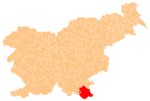Bojanci
Name
Bojanci was attested in 1674 as Dorff Woianze. The name is derived from the Slavic hypocorism Bojanъ, derived from the name Bojeslavъ (literally, 'he that wins fame through battle'). Like similar names (e.g., Bojanja Vas), the plural name thus means 'inhabitants of Bojan's village'. In the past the German name was Bojanze.
History
The village was established by Serbs that had joined the Uskok bands when fleeing Ottoman persecution (see Serbs of White Carniola). Bojanci is unique among the Serb-inhabited settlements because history records its foundation as taking place precisely in 1593. The village was founded by Montenegrin Serbs from the region of the Bojana river, who, following the end of the War of Cyprus, in which they participated on the Venetian side, settled first in Dalmatia, and then again, after the outbreak of the Long Turkish War, in White Carniola.
Church
The local church is thus a Serbian Orthodox Church, dedicated to the Beheading of St. John the Baptist. It dates to the late 18th century, when it replaced its wooden predecessor.
Demographics
According to the 1991 census:
- Serbs: 47 (46.1%)
- Slovenes: 18 (17.6%)
- Yugoslavs: 14 (13.7%)
- ethnic Muslims: 3 (2.9%)
- Croats: 1 (1.0%)
- Unknown: 19 (18.6%)
References
- ^ Statistical Office of the Republic of Slovenia
- ^ Leksikon občin kraljestev in dežel zastopanih v državnem zboru, vol. 6: Kranjsko. 1906. Vienna: C. Kr. Dvorna in Državna Tiskarna, p. 4.
- ^ Črnomelj municipal site
- ^ Snoj, Marko (2009). Etimološki slovar slovenskih zemljepisnih imen. Ljubljana: Modrijan. p. 69.
- ^ Miljić, Marijan Mašo (September 2, 2017). "Zaboravljena dijaspora: Crnogorci u slovenačkoj Beloj krajini". Vijesti. Retrieved January 21, 2018.
- ^ Slovenian Ministry of Culture register of national heritage reference number ešd 12913
